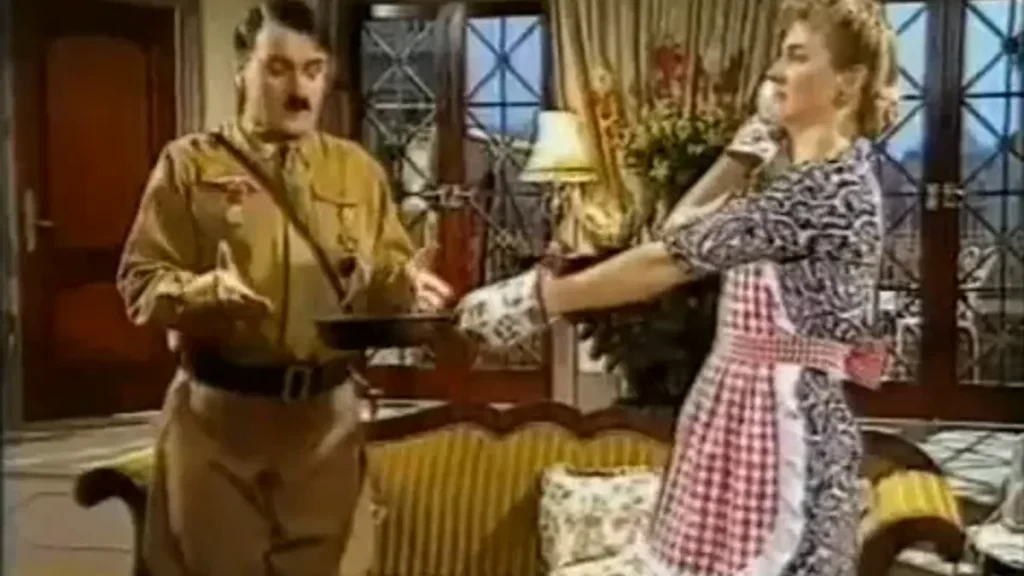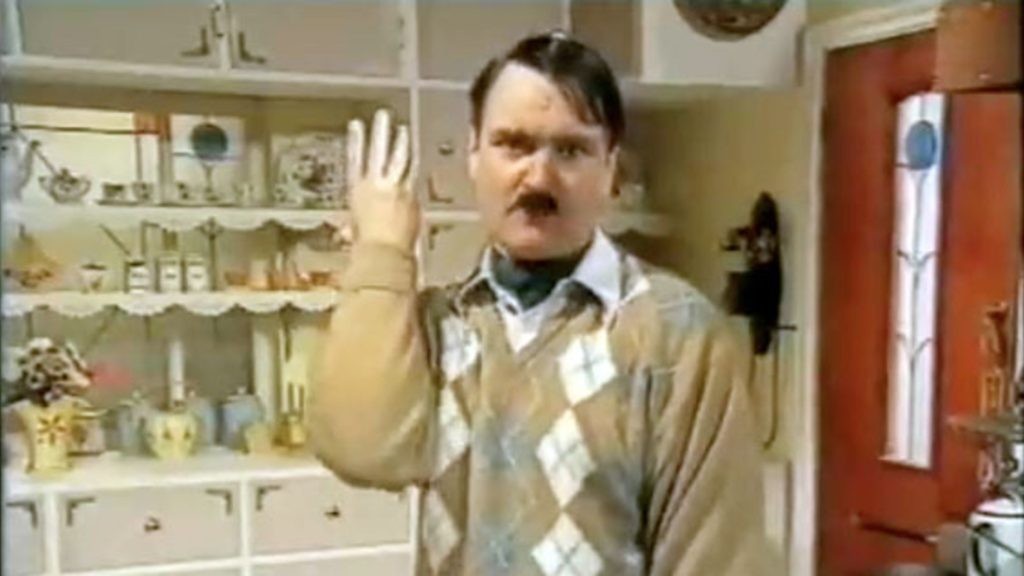In this FandomWire Video Essay, we explore the most shocking sitcom ever: Heil Honey I’m Home.
Check out the video below:
Subscribe & hit the Notification Bell so you never miss a video!
Heil Honey I’m Home Is Shocking
This… is Adolf Hitler. It’s not archival footage of the real-life German dictator or a performance from a historical drama recounting the figure’s many atrocities. This is a Hitler sitcom titled Heil Honey I’m Home. If you find that concept to be shocking … you’re not alone. The series aired only a single episode before being met with a barrage of outrage and criticism that ultimately led to its swift cancellation.
But how did the series ever get greenlit, to begin with? Who thought that a situational comedy in the vein of I Love Lucy centered on the man responsible for the genocide of around six million Jewish men, women, and children was something audiences wanted to watch? What exactly was the intention behind the show, and how did the ensuing backlash affect those involved? Well, prepare to cringe and be offended as we explore the most OFFENSIVE sitcom ever created.
The controversial concept came from the mind of British comedy writer Geoff Atkinson. Atkinson began his career writing for Punch Magazine, a weekly publication featuring satirical humor that was extremely prominent in the 1940s and 50s. And those satire roots are abundantly clear when looking at the structural basis of Heil Honey I’m Home. The series was intended to be a spoof of typical 1950s and 60s sitcoms featuring archetypal families overcoming minor hurdles, misunderstandings, and situational predicaments.
The series’ jarring title is a play on the greeting of “Hi, honey. I’m home” that was typical of these early sitcoms. Replacing “Hi” with “Heil” for a bit of tongue-in-cheek humor, acting as a wink and a nod to the audience while hinting at what’s to be expected over the next thirty minutes. According to Atkinson, the title was the first element of the series he conceived and was always going to be a part of the show. Heil was, of course, a form of verbal salute used by the nazi party in World War 2.
In the pilot episode of Heil Honey I’m Home, which aired in the UK on a Sunday evening in September of 1990, we’re introduced to the fictionalized, caricature-driven depictions of Adolf Hitler and his wife, Eva Braun. The series was filmed in front of a live studio audience, keeping with the tradition of the era of sitcoms being spoofed. There was applause as Eva and Adolf each entered the frame, immediately leading into a minor marital dispute about Adolf being late for dinner when Eva was making Schnitzel. This is followed up with a series of one-liners, such as Adolf declaring, “I’m a very, very bad Hitler” before slapping his own wrist, and insisting, “Eva! Babe, please… I’m the Fuhrer” while motioning to a portrait of himself mounted above the fireplace mantle. Each of these are followed by bouts of laughter from the audience.
From Heil Honey I’m Home‘s animated intro with an upbeat, melodic theme song over the opening credits, the tone and concept of the series are abundantly clear. The Hitlers live in a modest apartment, reminiscent of the one that Lucy and Ricky Ricardo share in I Love Lucy. The characters speak with generic New York accents, rather than German ones, utilizing a delivery that closely resembles that of Jackie Gleason’s “Ralph” in the iconic 1950s series The Honeymooners. Their next-door neighbors are a Jewish couple named Arny and Rosa Goldenstein. This was intended to be one of the driving plot points for the ensuing comedy. The concept of nosy and overbearing neighbors with clashing ideals has been an essential element of the sitcom fabric for decades and is often utilized in a manner that could be seen as offensive.
In Three’s Company, we see the late, great John Ritter playing Jack who pretends to be gay in order to live with his female roommates against the wishes of the landlords, who would never allow a straight man and woman to live together outside of marriage. It’s these landlords, first Mr. Roper and then Mr. Furley, who play the part of the intrusive neighbor, forcing Jack to embody homosexual stereotypes for comedic effect.
In the 1970’s there was All In The Family, following the lives of Archie Bunker and his family living in Queens New York. Archie was a white, narrow-minded, and often prejudiced character and his neighbors were The Jeffersons, an out-spoken black family acting as the counter to the Bunkers with much of the comedy stemming from the two patriarchs butting heads over their differing political viewpoints. The Jeffersons were so popular that they later received their own spinoff series which lasted an impressive two-hundred and fifty-three episodes, spanning eleven seasons.
While it’s clear that the aim of Heil Honey I’m Home! was to take advantage of this common sitcom trope and utilize a satirical lens to craft boundary-pushing comedy, the apparent trivialization of real-world atrocities was, understandably, unforgivable in the eyes of audiences. The secretary general for the ‘Board of British Jews’ released a statement saying “We are against any trivialisation of the Second World War, Hitler or the Holocaust, and this certainly trivializes those things. It’s very distasteful and even offensive.”
Political figures and historical events have long been targets of satire, and Hitler himself is no stranger to such depictions. In the Award Winning Jojo Rabbit, writer and director Taika Waititi portrayed a buffoonish, imaginary version of the Fuhrer that existed within the mind of a young German boy. Waititi, whose mother is of Russian-Jewish descent, chose to add the imaginary Dictator to the screenplay despite him not being present in the source novel in order to add another layer of biting commentary and insight to the story.
And back in the silent era of the 1940s, Charlie Chaplin brought us The Great Dictator, another comedic venture taking aim at the nazi party. Although the iconic filmmaker would later declare in his autobiography that had he understood the extent of the horrors being committed at the time he “Could not have made fun of the homicidal insanity of the Nazis.”
Still, this begs the question of why some comedic iterations of the evil figure are accepted, and even acclaimed, while others are met with harsh condemnation. And it ultimately boils down to the delivery. In Jojo Rabbit and The Great Dictator, the Nazi regime is the butt of the jokes. They are the ones being spoofed and the satire is at their expense with a lesson to be learned and a moral at the end of the story. Through his unlikely friendship with a young Jewish girl, Jojo ultimately learns valuable lessons of love and acceptance while coming to the realization that the people he idolized should never be idols.
This is one of the many failures of Heil Honey I’m Home! The apparent subject and brunt of the joke is the stereotypical structure of the classic American sitcom and its archetypal family dynamic, rather than Hitler himself.
Heil Honey I’m Home‘s pilot episode plot centered on the UK Prime Minister Neville Chamberlain as a dinner guest in the Hitlers’ home. It’s at this dinner, which is crashed by the Goldensteins against Adolf’s wishes, that Chamberlain presents Adolf with the Munich Agreement.
The Munich Agreement was a treaty that preceded the Second World War. In 1938 it was signed by both Neville Chamberlain and Adolf Hitler, as well as leaders from France and Italy. The treaty was an agreement that surrendered a border area of Czechoslovakia, known as Sudetenland, to Germany in exchange for a promise of peace from the Dictator… a promise he would not keep.
However, rather than exploring these significant real-world events with any depth, the series relies on generic jokes and simple gags to elicit a chuckle, like the Goldensteins becoming intoxicated and revealing to the Prime Minister that Adolf has tanks and battleships hidden, and frequently speaks of invading foreign countries. Of course, the generic nature of the series is likely the point, clashing the simplicity of suburban life with a figure as monstrous as Hitler.
During one interview, Atkinson spoke about the series’ conceptions saying, “My thinking was, how do you deal with a bully? There’s an argument that it’s equally good to destroy him once and for all by turning him into a joke, and who better to do that than the Jewish couple next door? That was the simple driving force.” While this logic is, at the very least, understandable, it’s the execution that’s lacking, prompting news outlets from across the globe, including the Los Angeles Times, to question the series’ merits.
In October of 1990, less than one month after the pilot episode aired, the LA Times published a damning article titled, “The Fuehrer in Britain: New Satellite Service Pins Its Hopes on ‘Dangerous’ Hitler Sitcom.” While it’s debatable as to whether this type of content is, in fact, dangerous, it was undoubtedly a bold and risky move for a smaller and newer broadcasting service to take on such a sitcom. It originally aired on the satellite television channel “Galaxy” as part of its “Galaxy Comedy Weekend.” It followed an episode of Dad’s Army, a series which starred distinguished English actor Arthur Lowe and was fittingly about the United Kingdom’s Home Guard during World War 2. During the closing credits of Dad’s War, an announcer’s voice could be heard declaring in a jovial tone, “And unless Arthur Lowe defeats him, it’s the man himself in a few moments in Heil Honey I’m Home!, as the Galaxy Comedy Weekend continues.”
Most of the outrage had begun to mount prior to Heil Honey I’m Home ever hitting TVs. As production on the ill-fated Heil Honey I’m Home waged on, people in charge began to have second thoughts. A new writer was brought on to oversee things and series creator Geoff Atkinson was less and less involved. Under new supervision, the role of the Goldensteins, those pesky Jewish neighbors, was reduced. According to cast members, the series was looking less and less like what it was originally intended to be, with plotlines that focused not on political events, but mundane endeavors like Adolf struggling to build a shelf. These changes wouldn’t matter though. Because despite the series being ordered for thirteen episodes, only eight of them were ever filmed and only one of them ever aired. The seven remaining episodes have remained unseen and Heil Honey I’m Home! has cemented itself in the realm of pop culture as the most offensive sitcom to ever exist.
Have you seen Heil Honey I’m Home? Do you think it went too far, or do you think under the veil of satire this type of comedy is acceptable? Let us know in the comments and be sure to like, subscribe and hit the notification bell so you never miss a video.
Follow us for more entertainment coverage on Facebook, Twitter, Instagram, and YouTube.
Note: If you purchase an independent product featured on our site(s), we may earn a small commission from the retailer. Thank you for your support.



